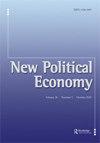家庭负债是否导致了工会密度的下降?
IF 3.8
2区 经济学
Q1 ECONOMICS
引用次数: 0
摘要
本文认为,家庭负债的增加与有组织劳动力的减少有关。在过去的几十年里,金融系统越来越多地为工薪阶层家庭提供资金,最近的研究表明,负债的员工在工作场所变得更加厌恶风险,因为他们担心失去工作和违约。因此,由于工会的成立或参与通常会受到裁员的惩罚,家庭负债的上升很可能与工会化的总体减少有关。本研究考察了1965年至2018年期间高、中、低工会化经济体的这一观点:分别是瑞典、日本和韩国。回归分析为支持这一论点提供了强有力的支持。研究结果还表明,有关个人破产的金融监管和社会规范对家庭债务对工会化的影响程度至关重要。本文章由计算机程序翻译,如有差异,请以英文原文为准。
Does household indebtedness contribute to the decline of union density?
This paper argues that rising household indebtedness is associated with the decline of organised labour. Over the last decades, the financial system is increasingly financing working-class households, and recent research shows that indebted employees become more risk-averse at the workplace on the fear of losing their job and defaulting. Thus, since union formation or participation is commonly punished with redundancy, rising household indebtedness is likely to be associated with the aggregate reduction in unionisation. This study examines this argument for a high-, a mid-, and low-unionisation economy over the period 1965–2018: Sweden, Japan, and South Korea, respectively. Regression analysis provides robust support in favour of this argument. The results also suggest that financial regulation and social norms about personal insolvency matter for the size of the effects of household debt on unionisation.
求助全文
通过发布文献求助,成功后即可免费获取论文全文。
去求助
来源期刊

New Political Economy
Multiple-
CiteScore
10.10
自引率
9.50%
发文量
41
期刊介绍:
New Political Economy aims to create a forum for work which combines the breadth of vision which characterised the classical political economy of the nineteenth century with the analytical advances of twentieth century social science. It seeks to represent the terrain of political economy scholarship across different disciplines, emphasising original and innovative work which explores new approaches and methodologies, and addresses core debates and issues of historical and contemporary relevance.
 求助内容:
求助内容: 应助结果提醒方式:
应助结果提醒方式:


